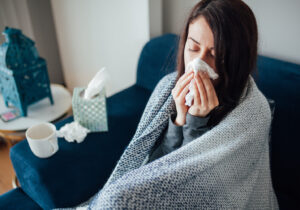
What is the difference between COVID-19, the flu, and a cold?
In light of current events, we are all concerned about respiratory viruses. Understanding the difference between coronaviruses, flu viruses, and colds can seem overwhelming, so SignatureMD put together the following guide to help you keep yourself and those you love healthy.
What are coronaviruses?
Coronaviruses are a large group of viruses common in humans and animal species around the world. Seven strains of coronavirus are known to infect people. Four of these strains only cause minor respiratory illnesses, such as the common cold. In fact, most of us have been infected with one or more of these viruses during our lifetime. Three strains of coronavirus are associated with severe and potentially fatal respiratory illness:
- MERS-CoV is the virus that causes Middle East respiratory syndrome.
- SARS-CoV is the virus that causes severe acute respiratory syndrome.
- 2019-nCoV is the virus that causes COVID-19, which stands for coronavirus disease 2019.
Although the MERS, SARS, and 2019-nCoV viruses are all in the same family, they do behave differently and require different treatments.
What are the symptoms of COVID-19?
The symptoms of COVID-19 can range from no symptoms to severe respiratory illness. The most common symptoms include fever, cough, difficulty breathing, and shortness of breath. Based on what we know about the disease at this time, it appears that older adults and individuals with underlying health conditions or weakened immune systems have the highest risk of developing severe symptoms or complications.
What causes the flu?
There are four basic types of influenza viruses. The A and B flu strains are responsible for the seasonal flu epidemics that we tend to see every winter. The C strain of the virus normally only causes mild symptoms and is not believed to cause human flu epidemics. The D strain of the virus primarily affects cattle and is not known to cause human illness.
What are the most common flu symptoms?
Flu viruses can cause similar symptoms to those caused by the 2019 coronavirus. They are, however, two distinct viruses, which means that they do not respond to the same treatments. The most common symptoms of the flu include fever, cough, muscle and body aches, sore throat, headaches, and fatigue.
What are the most common cold symptoms?
Colds are characterized by mild upper respiratory symptoms, including sneezing, runny nose, coughing, stuffy nose, sore throat, and watery eyes. The symptoms typically resolve without medical treatment; however, rest, fluids, and over-the-counter cold remedies may help minimize the symptoms.
What treatments and prevention options are available?
There is currently no vaccine or definitive treatment for coronavirus 2019, but various studies are underway. At this time, treatment is aimed at managing individual symptoms, preventing complications, and supporting vital organ function when necessary.
The annual flu vaccine offers the best protection against the strains of the influenza virus expected to circulate during flu season. The Centers for Disease Control and Prevention recommends the annual flu vaccine for adults and children over the age of six months. In some instances, antiviral medications may be prescribed to lessen the severity of flu virus symptoms.
It is important to remember that antibiotics are not effective against viral infections, such as colds, 2019-nCoV, and the seasonal flu.
These are general steps you can take to prevent respiratory illnesses:
- Wash your hands frequently using soap and water. The CDC recommends washing your hands for at least 20 seconds, which is about the time that it takes to sing the birthday song twice.
- Cover your nose and mouth when you cough or sneeze using a tissue or the crook of your elbow. Be sure to dispose of your tissue in the trash and wash your hands afterward.
- Clean and disinfect frequently used surfaces and objects often.
- Don’t touch your nose, eyes, or mouth with unwashed hands.
- Avoid close contact with individuals who are ill.
In response to the COVID-19 pandemic, federal, state, and local health authorities have implemented a variety of measures aimed at slowing the spread of the disease, including closing non-essential businesses, canceling public gatherings, and encouraging people to stay at home except for essential activities. In addition to the measures listed above, the CDC is also encouraging people to work from home if possible, avoid contact with individuals who are at increased risk for serious illness, and to wear a cloth face mask when out in public. This is a rapidly changing situation, so it is essential that we all stay up to date on the latest information and instructions from our local and state governmental and public health authorities.
What should I do if I get sick?
If you experience respiratory symptoms, call your doctor. He or she can tell you if your symptoms are serious enough to require treatment and the steps you need to take to protect others.